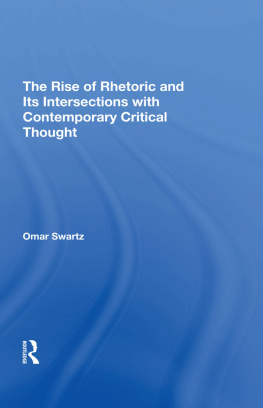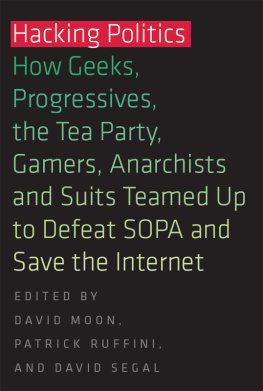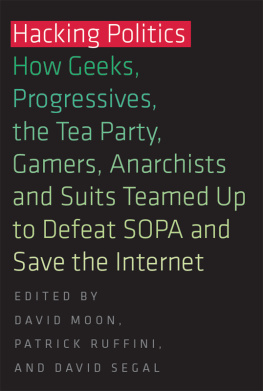Thank you for downloading this Scribner eBook.
Join our mailing list and get updates on new releases, deals, bonus content and other great books from Scribner and Simon & Schuster.
C LICK H ERE T O S IGN U P
or visit us online to sign up at
eBookNews.SimonandSchuster.com
We hope you enjoyed reading this Scribner eBook.
Join our mailing list and get updates on new releases, deals, bonus content and other great books from Scribner and Simon & Schuster.
C LICK H ERE T O S IGN U P
or visit us online to sign up at
eBookNews.SimonandSchuster.com
To my parents
AUTHORS NOTE
T his book began as an article in the online magazine Slate . The article was a long profile of Aaron Swartz, his life and work and undoing, written and reported in the weeks after his death. Called The Idealist, it ran on February 7, 2013. The next day, an editor at Scribner contacted me and suggested that I consider expanding the story into a book. I spent several months completing a book proposal, and when I was finally finished, I realized that my book had no title. After giving it some very brief considerationI pluralized the title of the Slate profile and called the book The Idealists , thinking that we would come up with a better title later. We did: The Idealist . Sometimes your first instincts are your best ones.
The Idealist is not meant as a comprehensive biography of Aaron Swartz or a comprehensive history of Internet activism or American copyright law. Little at all about this book is comprehensive. Someone could easily make another book consisting exclusively of material omitted from this one, and if you do, please send me a copy. Instead, The Idealist is a provisional narrative introduction to the story of free culture in America, using Swartzs life as a lens on the rise of information sharing in the digital age.
The first half of this book presents a basic narrative introduction to the history of copyright and free culture in America. In these chapters, I focus on various representative individuals whom I found interesting and significant, in hopes that emphasizing their personal stories will help animate and simplify otherwise abstract topics. Chapters 3 and 4 utilize archival research performed at the University of Illinois at Urbana-Champaign, which hosts both Michael Harts personal papers and the archives of the American Library Association.
The second half of this book is based mostly on a close reading of Swartzs own writings, supplemented by interviews and public documents. Chapter 8 employs a trove of redacted internal JSTOR e-mails to tell the story of Swartzs fateful MIT downloading spree. Chapters 9 and 10 draw on thousands of pages of redacted US Secret Service documents acquired through the Freedom of Information Act by Wired s Kevin Poulsen. Throughout the book, I have occasionally reused some material from my original Slate profile of Swartz. This material is used with Slate s permission, and I am grateful to Slate for granting it.
I decided to let Swartzs own voice be the principal one in this story, in an attempt to simulate aspects of a first-person narrative. I have emphasized certain incidents and characters and de-emphasized others, for reasons of thematic relevance and narrative economy. Other ways of telling Swartzs story certainly exist, and I can only hope that any deficiencies in my own approach are offset by its merits. I hope I have contextualized a debate that often seems entirely contemporary, humanized some of its most revered figures, and inspired curious readers to pursue further research on the issues and the individuals covered herein. Any errors and omissions are my responsibility alone.
Justin Peters
Boston, Massachusetts, July 2015
INTRODUCTION: THE BAD THING
O n Friday, January 4, 2013, Aaron Swartz awoke in an excellent mood. He brought his girlfriend, Taren Stinebrickner-Kauffman, up to the roof of their apartment building in Brooklyn, New York. Under overcast skies, he turned to her and said, unprompted, This is going to be a great year.
The statement was wildly optimistic. Two years earlier, Swartz had been caught using the computer network at the Massachusetts Institute of Technology to download millions of scholarly journal articles from the online database JSTOR. While downloading academic papers is not in itself against the law, doing so in bulk without explicit authorization isor, at least, that was what the US Attorneys Office in Boston had claimed. Swartz was arrested and indicted on felony computer-crime charges that carried a maximum penalty of ninety-five years in prison and more than $3 million in fines.
Swartz ran no risk of receiving the top sentence. But his friends and family did not think he deserved any prison time at all. When his former girlfriend Quinn Norton met with the prosecutors in April 2011, she marveled at their stubborn insistence that excessive downloading was a serious crime. I told them this case was ridiculous,
The prosecutors, as prosecutors tend to do, were using the threat of a long sentence to pressure Swartz into pleading guilty. But they were adamant that any plea bargain would have to include some jail time. The government initially offered Swartz a relatively lenient deal: plead guilty to a single felony count and serve a few months in a federal prison, followed by a period of supervised release.
But Swartz refused to sign any plea that would send him to prison. He resented that the supervised release program would restrict his access to computers. Nor was he keen to have a felony conviction on his record. Several months after his arrest, Swartz and Norton had visited Washington, DC. While walking by the White House, Swartz got sad. They dont let felons work there, he said.
Swartz was twenty-six, small and dark, with shaggy black hair that fell below his ears, and an occasional beard that fell somewhere between stubble and scruff. As a boy he had been ashamed of his body, which he felt was embarrassingly chubby.
Swartz never told anyone how much money he earned from the sale, though it was clearly a substantial amount. His reticence became a running joke between us, Norton wrote, me prying, cajoling, pressuring, and Aaron never giving in.to himself. When Swartz first started dating Taren Stinebrickner-Kauffman, he withheld all details of his legal predicament, not even mentioning that he had been arrested. Instead, he referred to the case, euphemistically, as the bad thing.
The bad thing came into being during the first few days of January 2011, when network engineers at the Massachusetts Institute of Technology discovered a laptop concealed in a basement closet and wired into the campus network. The computer had been programmed to download documents from JSTOR at a rapid rate. The school installed a surveillance camera and, on January 6, photographed a young white male with dark, wavy hair entering the closet to retrieve the laptop. The man attempted to conceal his face behind a bicycle helmet, but he was clearly Aaron Swartz.
This discovery raised far more questions than it answered. Aaron Swartz was famous. He was neither a malicious hacker nor a vandalistic script kiddie, but rather a well-known programmer and political activist. He was friends with the Internet icons Lawrence Lessig and Tim Berners-Lee. He was a research affiliate at Harvard. His blog was internationally popular. So why was he skulking around an MIT basement siphoning obscure research papers like some tenure-track cat burglar? What were his plans for the nearly 5 million JSTOR documents he had acquired? What in the world was he thinking ?
Even two years after his arrest, these questions remained unanswered. The prosecutors believed that Swartz intended to post the JSTOR archives for free on the Internet. Since childhood, he had been affiliated with the free culture movement, whose members believe that digital networks ought to remove barriers to information access, not erect themthat the Internet ought not to be considered a bookstore so much as an infinite library, its contents made available for the benefit of all.
Next page











